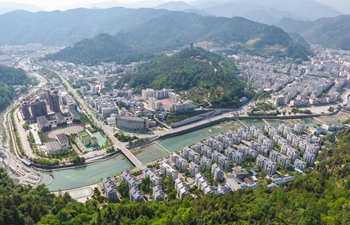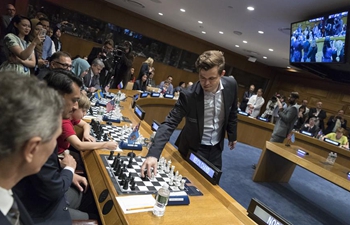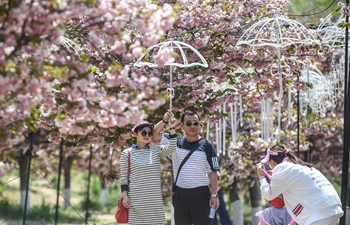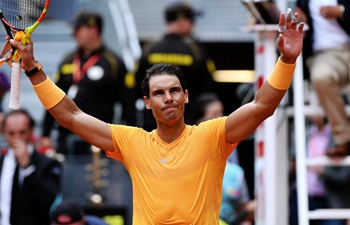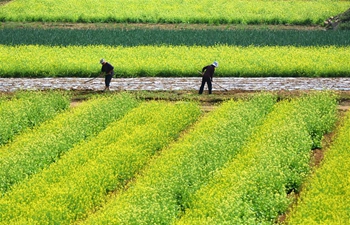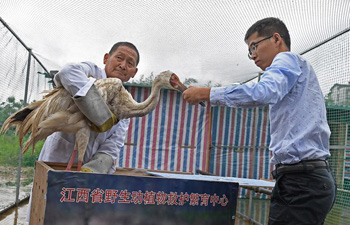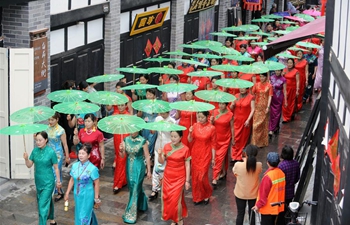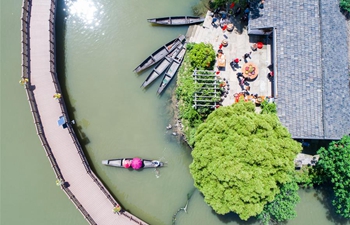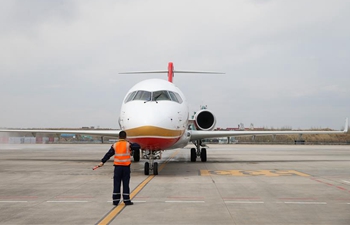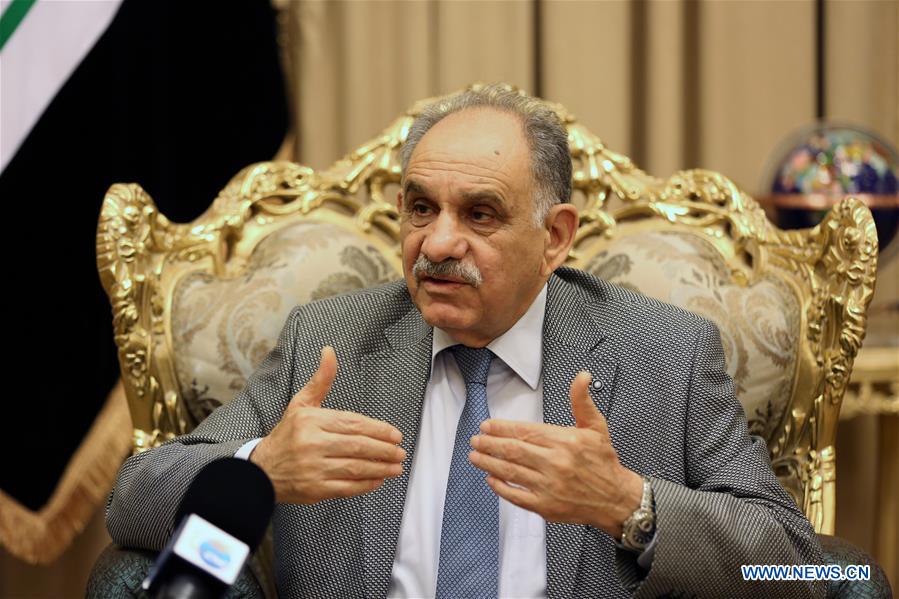
Salih al-Mutlak, Iraq's former deputy prime minister, speaks during an interview with Xinhua in Baghdad, Iraq, on May 10, 2018. Salih al-Mutlak said Saturday's parliamentary elections could be pivotal in Iraq's history, if Iraqi voters choose the right candidates to get rid of corrupt and sectarian parties. (Xinhua/Khalil Dawood)
BAGHDAD, May 11 (Xinhua) -- Salih al-Mutlak, Iraq's former deputy prime minister, said Saturday's parliamentary elections could be pivotal in Iraq's history, if Iraqi voters choose the right candidates to get rid of corrupt and sectarian parties.
In an exclusive interview with Xinhua in his office at Baghdad heavily fortified Green Zone, the prominent Sunni figure at al-Wataniyah (National) Coalition said "I wish the Iraqi people to clean up the political process from both corrupt and sectarian politicians."
Mutlak said the change should be voting for candidates who are seen as clean-handed from corruption or killings of innocent Iraqis during the past insecure and chaotic years, by the ballot boxes.
Mutlak believed that the greatest challenge for Iraq is the extensive devastation that swept the urban areas in the Sunni provinces due to the war against Islamic State (IS) militants.
"The government must guarantee people's return to their homes, and compensate them for the destruction of their properties, so they are able to bring their life back by returning to their homes, farms and factories," Mutlak said.
However, Mutlak realized that Iraq is not ready for such huge task of rebuilding millions of people's lives in devastated urban areas of the Sunni provinces in northern and western Iraq.
The battles against the extremist IS militants in the Sunni provinces left millions of residents without work and living in half-ruined cities, while 2.2 million remain displaced according to figures of the United Nations Office for the Coordination of Humanitarian Affairs in Iraq.
The embarrassing situation pushed the Iraqi government to ask the international community to help with rebuilding the devastated areas.
Mutlak said that Iraq fought IS militants not only to free its land, but also on behalf of the whole world as terrorism is a global threat.
"There is a moral responsibility in the world to support the Iraqis, in particular, the part of Iraqis (Sunni community) who were affected by Daesh (IS group), as the war occurred in their region. They have to help them return to their homes and rehabilitate their areas," Mutlak said.
Asked who the frontrunner in the upcoming parliamentary elections will be, Mutlak said the old leading coalitions will take the lead and no considerable change will happen.
"The newly established parties will not have effective presence after the elections, because they do not have enough popularity, funds, time nor experience to express themselves," he said.
Mutlak said that May 12 elections are better than the previous 2014 elections, as there is no interference by the security forces in the electoral process.
"They (security authority) used to announce surprised decisions on the day of voting to prevent people from heading to polling centers, such as imposing traffic ban suddenly, and then the voters would have to walk for five to ten kilometers to reach the ballot boxes," he said.
"They also used to arrest people before the elections, to spread panic among civilians," Mutlak said, adding that he has not seen such cases in this election.
In Iraq, sectarianism was the main reason for bloodshed that engulfed the country during the years following the U.S.-led invasion, which resulted in the killing of hundreds of thousands of people.
However, Mutlak believed that sectarian strife began to decline as a result of citizen's awareness.
"The Iraqi people began to think that sectarianism has destroyed their country, made their people fighting each other, and generated terrorism," Mutlak said.
The political parties were forced to abandon sectarian rhetoric, because they realize that it is of no more use, and the Iraqi society would not buy sectarian orientation anymore as people did in the past, according to Mutlak.
However, Mutlak hinted that Iraq is also facing some threats, as there are still weapons, which are not under control of the government.
As for Iraq's relations with the world's countries, al-Mutlak said "I believe that Iraq must pursue friendly rhetoric and build balanced relations with all countries."
"Iraq's relations must be based on preserving sovereignty and distancing itself from conflicts which loom in the horizon between the United States and Iran, or between some Arab countries and Iran," Mutlak said.
"Iraq has paid a lot of blood and a great price because of these conflicts," he added.
More than 24 million Iraqis are eligible to vote in the 4,148 polling centers across Iraq in the first general election since Iraq's historical victory over the IS militant group last December.
About 7,000 candidates, representing 205 political entities, will compete for the 329 parliamentary seats to form a new government, which will rule Iraq for the next four years.
Observers believe that the elections are of great importance in Iraq's history as they are held under improved security situation compared to previous polls.
The elections are also held under less sectarian tension due to increased awareness of Iraqi citizens, who are seeking national unity for all Iraqi factions.




